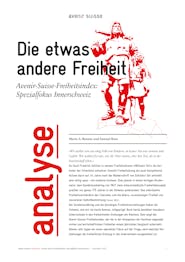One hundred and seventy-five years ago, the cantons took up arms against each other. In the Sonderbund War, the radical-liberal forces were nominally victorious over the Catholic conservatives, but in the long run, everyone was a winner: In 1848, a federalist state was founded that remains a model to this day. The different mentalities among the cantons, however, have remained. Every year since 2012, Avenir Suisse has been publishing the Avenir Suisse Freedom Index, a detailed examination of how the cantons differ.
Focus on Central Switzerland
To mark the anniversary of the Sonderbund, in a publication accompanying the Freedom Index, Avenir Suisse is focusing on the Central Swiss cantons of Uri, Schwyz, Obwalden, Nidwalden, Lucerne, and Zug. What emerges is that Central Switzerland is more restrictive than other cantons when it comes to civil liberties. The cantons of central Switzerland seem to have difficulty with a strict separation of church and state. Likewise, some of these cantons could introduce more effective freedom of information legislation. In the economic sphere, on the other hand, the region excels with moderate fiscal capacity utilization and a low fiscal burden.
There have been no tectonic shifts in the nationwide rankings in the latest edition of the freedom index. As last year, Appenzell-Ausserrhoden (1st) ranks top, followed by the Principality of Liechtenstein (2nd) and Aargau (3rd), with Schwyz (4th) and Zug (5th) hot on their heels.
A Look at “Latin” Switzerland
It’s always worth taking a look at non-German-speaking Switzerland, especially Canton Jura – and not just because of its new federal councilor. For the second time running, Switzerland’s youngest canton takes first place for civil liberties, while once again ranking last in terms of economic liberties. This still yields 7th place in the overall rankings, closely followed by Ticino in 8th place.
Neuchâtel, Vaud, and Fribourg appear somewhere in the middle of the table in 12th, 15th, and 17th place respectively. Vaud has managed to move up three places this year. This is due, among other things, to the fact that the canton’s public spending ratio has improved and the proportion of employees in the public sector has fallen somewhat. At the bottom of the overall rankings are Valais and Geneva: both are only middling in terms of civil liberties, and have the worst scores in Switzerland for economic liberties.
Urban Cantons Heavily Regulated
The development of the urban cantons of Zurich and Basel-Stadt is also interesting: Basel-Stadt has slipped one rank to 6th thanks to a tangible decline in civil liberties. One area where the canton has fallen back is the maximum length of time video surveillance data can be kept.
The canton of Zurich, on the other hand, is bang in the middle of the overall cantonal rankings. A pronounced culture of prohibitions and a lack of efficiency in providing public security have put it in last place for civil liberties. The fact that Zurich managed to finish in the middle of the pack is primarily thanks to the freedom-related weaknesses of its competitors. The tax burden on both average families and second earners in Zurich has increased significantly compared with other parts of Switzerland. Its fiscal capacity utilization also gets a worse rating than in the previous year. Zurich’s creditworthiness and high degree of decentralization, on the other hand, are worthy of positive mention.
The scars of the Sonderbund War may have healed, but the differences across the Confederation have remained – and with them the incentive to survive in the competition between the cantons.
The Avenir Suisse Freedom Index is an interactive online publication. It allows you, for example, to compare individual cantons with one another or include or exclude specific indicators to create your own personal freedom index.






